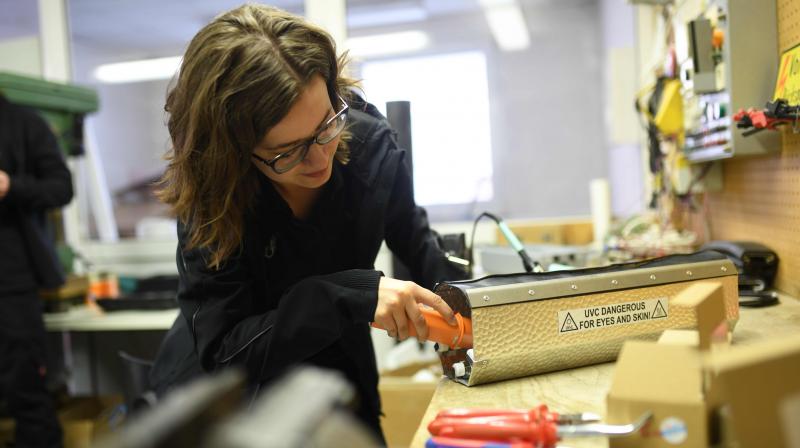Demand surges for escalator disinfecting fitment made by German startup amid COVID-19

Collected
Tanja Nickel and Katharina Obladen were still in highschool once they patented a thought to disinfect escalator handrails using UV light.
A decade later, their small German startup UVIS can barely continue with orders from round the world for his or her coronavirus-killing escalators and coatings for supermarket trolleys and elevator buttons.
“Everybody wants it done yesterday,” Obladen, 28, told AFP at the company’s workshop in central Cologne.
“The pandemic has made businesses realise they have to take a position in hygiene precautions for workers and customers. It’s gone from nice-to-have to must-have.”
As Germany begins to relax some lockdown restrictions, the startup’s five-person team has been inundated with requests from shops, offices and cafes wanting to reopen to a public newly conscious of the health risks lurking in shared spaces.
Contest
Friends since kindergarten, Nickel and Obladen were 17 and 18 years old once they entered an inventors’ competition.
Worried about the swine influenza pandemic at the time, they wanted to return up with something to form public places germ-free.
Inspired by ny City’s use of ultraviolet to sterilise beverage , they designed a UV light box which will be built into escalators to disinfect handrails, with the radiation destroying the DNA of disease-causing micro-organisms.
They asked their families for help filing the patent.
“They knew us and knew we might persist with it,” Obladen recalled.
After finishing university, the pair founded UVIS in 2016 with capital from programmes for startups. they continue to be a rare example in Germany of girls running an engineering firm.
This year, the duo added an antimicrobial coating to their line-up, not supported UV technology. The invisible coating are often sprayed onto surfaces to destroy mould, bacteria and viruses just like the novel coronavirus, using the self-cleaning properties of titanium oxide .
Dangerous
Europe’s largest elevator and escalator makers—Thyssenkrupp, Schindler, Otis and Kone—were early customers, putting the women’s ultraviolet boxes, called Escalite modules, in escalators in malls, hospitals and train stations.
But the coronavirus has seen demand explode.
“We’ve already surpassed our revenue target for 2020,” said 27-year-old Nickel, declining to offer figures.
Interest has been especially strong in Europe and Asia. The startup recently shipped over 30 escalator modules to Singapore.
Standing within the same workshop where her electrician grandfather wont to tinker away and where his old hard hats still line the shelves, Obladen demonstrated how the sunshine box works.
Three blue-glowing UVC lamps, emitting the strongest quite UV beams and highly dangerous when exposed to skin and eyes, line the within of an oblong metal case.
The escalator’s handrail passes through the case because it continually loops around, getting a full blast of germ-killing radiation.
The metal case, roughly the dimensions of an adult arm, and an accompanying power box are often fitted into any escalator, which Obladen said was “the biggest challenge”.
UV disinfection was already routinely utilized in the food industry and hospitals worldwide before COVID-19 spurred wider involves the technology.
In China, where the virus first emerged, it's been wont to clean buses and banknotes.
Obladen said they too were considering other ways to deploy UVC light.
Source: https://www.deccanchronicle.com
Tags :
Previous Story
- Persistent tourism in Sausalito irks virus-minded locals
- 815 lose jobs in Ashulia factory layoff
- Bangladesh, 38 other countries notify virus-linked export bars...
- Bangladesh to consider easing age restrictions for jobs...
- COVID-19 Disruptions: Understanding Food Security Implications
- The Most Tourism-Dependent Region on the globe Braces...
- Unemployed and tips, restaurant employees fighting the crisis...
- Govt in great pickle over next fiscal year’s...